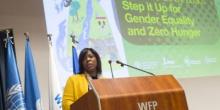Liberia: Prosecuting gender violence crimes
More than a decade after the civil war in Liberia ended, sexual violence remains rife.

Gender inequality is an affront to human dignity, a challenge to the rule of law and an obstacle to development. Denying women of their rightful place in society – by depriving them of equal access to education, justice or livelihood – means robbing societies of the talent and potential of half of their members. In securing every social need from peace to food, the role of women has been shown to be paramount.
Although gender equality is increasingly a feature of national Constitutions, the law often continues to restrict women's rights and freedoms, dictates their submission to male relatives, or limits what they may own or inherit.
More than a decade after the civil war in Liberia ended, sexual violence remains rife.

In Burundi, land tenure registration is the primary way for the government to deal with the large number of land disputes across the country. A series of pilot programs aimed at resolving land rights issues have been initiated in recent years. To date, however, it is unclear whether these pilot programs have had their intended effect of reducing the number of land disputes.
In June 2015, IDLO commenced the project: Researching the Impact of Land Tenure Registration on Land Disputes and Women’s Land Rights in Burundi.
Land Tenure Registration (LTR) programs involve issuing proof of ownership to holders of land rights to increase their legal certainty. Such programs are undertaken for a variety of reasons. While much is known about the impact of LTR on factors like access to credit and agricultural output, there is a gap in knowledge of its impact on land disputes, particularly in post-conflict settings.
ROME - Leaders of international organizations based in Rome today gathered to highlight the achievements and the real prospects for achieving gender equality. The speakers all agreed accelerating the empowerment of women everywhere is fundamental to achieving a zero hunger world and reaching the world’s new Sustainable Development Goals (SDGs).

I was facing a lot of problems …. my case was not addressed in court……I didn’t have the possibility of opening my own bank account ….. the money I was getting from sewing, knitting and cooking had to just be kept in the shelter’s office.

The refugee crisis has clearly shown that the European refugee system is broken and must be fixed urgently

Mongolia has formally joined IDLO, the latest stage in an expanding partnership for the advancement the rule of law. The first communist-ruled nation outside the Soviet Union, Mongolia has over the last two decades built a democracy that is untypical of its region. But for all the efforts of its political class and civil society, it has some way to go to improve governance, enhance access to justice, and reduce inequality.
Languages: English, Pусский
While Mongolia enjoys a reasonably good overall human rights record, the picture is somewhat bleaker when it comes to domestic violence; and despite a number of recent, positive regulatory and judicial steps aimed at tackling it, domestic violence remains a pressing issue.
Languages: English, Español






|
Publication
|
|
Policy Statements
|